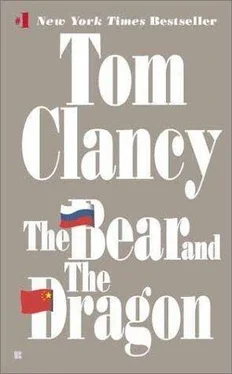Tom Clancy - The Bear and the Dragon
Здесь есть возможность читать онлайн «Tom Clancy - The Bear and the Dragon» весь текст электронной книги совершенно бесплатно (целиком полную версию без сокращений). В некоторых случаях можно слушать аудио, скачать через торрент в формате fb2 и присутствует краткое содержание. Год выпуска: 2001, ISBN: 2001, Жанр: Триллер, на английском языке. Описание произведения, (предисловие) а так же отзывы посетителей доступны на портале библиотеки ЛибКат.
- Название:The Bear and the Dragon
- Автор:
- Жанр:
- Год:2001
- ISBN:780425180969
- Рейтинг книги:3 / 5. Голосов: 1
-
Избранное:Добавить в избранное
- Отзывы:
-
Ваша оценка:
- 60
- 1
- 2
- 3
- 4
- 5
The Bear and the Dragon: краткое содержание, описание и аннотация
Предлагаем к чтению аннотацию, описание, краткое содержание или предисловие (зависит от того, что написал сам автор книги «The Bear and the Dragon»). Если вы не нашли необходимую информацию о книге — напишите в комментариях, мы постараемся отыскать её.
The Bear and the Dragon — читать онлайн бесплатно полную книгу (весь текст) целиком
Ниже представлен текст книги, разбитый по страницам. Система сохранения места последней прочитанной страницы, позволяет с удобством читать онлайн бесплатно книгу «The Bear and the Dragon», без необходимости каждый раз заново искать на чём Вы остановились. Поставьте закладку, и сможете в любой момент перейти на страницу, на которой закончили чтение.
Интервал:
Закладка:
“Good day,” the young lady said in reply. “Are you Nomuri?”
“Yes, and you are …?”
“Lian Ming,” the secretary replied.
An interesting name, Chester thought. “Lian” in Mandarin meant “graceful willow.” She was short, like most Chinese women, with a square-ish face and dark eyes. Her least attractive feature was her hair, short and cut in a manner that harkened back to the worst of the 1950s in America, and then only for children in Appalachian trailer parks. For all that, it was a classically Chinese face in its ethnicity, and one much favored in this tradition-bound nation. The look in her eyes, at least, suggested intelligence and education.
“You are here to discuss computers and printers,” she said neutrally, having absorbed some of her boss’s sense of importance and centrality of place in the universe.
“Yes, I am. I think you will find our new pin-matrix printer particularly appealing.”
“And why is that?” Ming asked.
“Do you speak English?” Nomuri asked in that language.
“Certainly,” Ming replied, in the same.
“Then it becomes simple to explain. If you transliterate Mandarin into English, the spelling, I mean, then the printer transposes into Mandarin ideographs automatically, like this,” he explained, pulling a sheet of paper from his plastic folder and handing it to the secretary. “We are also working on a laser-printer system which will be even smoother in its appearance.”
“Ah,” the secretary observed. The quality of the characters was superb, easily the equal of the monstrous typewriting machine that secretaries had to use for official documents-or else have them hand-printed and then further processed on copying machines, mainly Canons, also of Japanese manufacture. The process was time-consuming, tedious, and much hated by the secretarial staff. “And what of inflection variations?”
Not a bad question, Nomuri noted. The Chinese language was highly dependent on inflection. The tone with which a word was delivered determined its actual meaning from as many as four distinct options, and it was also a determining factor in which ideograph it designated in turn.
“Do the characters appear on the computer screen in that way as well?” the secretary asked.
“They can, with just a click of the mouse,” Nomuri assured her. “There may be a ‘software’ problem, insofar as you have to think simultaneously in two languages,” he warned her with a smile.
Ming laughed. “Oh, we always do that here.”
Her teeth would have benefited from a good orthodontist, Nomuri thought, but there weren’t many of them in Beijing, along with the other bourgeois medical specialties, like reconstructive surgery. For all that, he’d gotten her to laugh, and that was something.
“Would you like to see me demonstrate our new capabilities?” the CIA field officer asked.
“Sure, why not?” She appeared a little disappointed that he wasn’t able to do so right here and now.
“Excellent, but I will need you to authorize my bringing the hardware into the building. Your security people, you see.”
How did I forget that? he saw her ask herself, blinking rather hard in a mild self-rebuke. Better to set the hook all the way.
“Do you have the authority for that, or must you consult someone more senior?” The most vulnerable point in any communist bureaucrat was their sense of importance-of-place.
A knowing smile: “Oh, yes, I can authorize that on my own authority.”
A smile of his own: “Excellent. I can be here with my equipment at, say, ten in the morning.”
“Good, the main entrance. They will be awaiting you.”
“Thank you, Comrade Ming,” Nomuri said with his best officious (short) bow to the young secretary-and, probably, mistress to her minister, the field officer thought. This one had possibilities, but he’d have to be careful with her both for himself and for her, he thought to himself while waiting for the elevator. That’s why Langley paid him so much, not counting the princely salary from Nippon Electric Company that was his to keep. He needed it to survive here. The price of living was bad enough for a Chinese. For a foreigner, it was worse, because for foreigners everything was-had to be-special. The apartments were special-and almost certainly bugged. The food he bought in a special shop was more expensive-and Nomuri didn’t object to that, since it was also almost certainly healthier.
China was what Nomuri called a thirty-foot country. Everything looked okay, even impressive, until you got within thirty feet of it. Then you saw that the parts didn’t fit terribly well. He’d found it could be especially troublesome getting into an elevator, of all things. Dressed as he was in Western-made clothing (the Chinese thought of Japan as a Western country, which would have amused a lot of people, both in Japan and the West), he was immediately spotted as a qwai -a foreign devil-even before people saw his face. When that happened, the looks changed, sometimes to mere curiosity, sometimes to outright hostility, because the Chinese weren’t like the Japanese; they weren’t trained as thoroughly to conceal their feelings, or maybe they just didn’t give a damn, the CIA officer thought behind his own blanked-out poker face. He’d learned the practice from his time in Tokyo, and learned it well, which explained both why he had a good job with NEC and why he’d never been burned in the field.
The elevator ran smoothly enough, but somehow it just didn’t feel right. Maybe it was, again, because the pieces didn’t quite seem to fit together. Nomuri hadn’t had that feeling in Japan. For all their faults, the Japanese were competent engineers. The same was doubtless true of Taiwan, but Taiwan, like Japan, had a capitalist system which rewarded performance by giving it business and profits and comfortable salaries for the workers who turned out good work. The PRC was still learning how to do that. They exported a lot, but to this point the things exported were either fairly simple in design (like tennis shoes), or were manufactured mostly in strict accordance to standards established elsewhere and then slavishly copied here in China (like electronic gadgets). This was already changing, of course. The Chinese people were as clever as any, and even communism could keep them down only so long. Yet the industrialists who were beginning to innovate and offer the world genuinely new products were treated by their government masters as … well, as unusually productive peasants at best. That was not a happy thought for the useful men who occasionally wondered over drinks why it was that they, the ones who brought wealth into their nation, were treated as … unusually productive peasants, by the ones who deemed themselves the masters of their country and their culture. Nomuri walked outside, toward his parked automobile, wondering how long that could last.
This whole political and economic policy was schizophrenic, Nomuri knew. Sooner or later, the industrialists would rise up and demand that they be given a voice in the political operation of their country. Perhaps-doubtless-such whispers had happened already. If so, word had gotten back to the whisperers that the tallest tree is quickly cut for lumber, and the well with the sweetest water is first to be drunk dry, and he who shouts too loudly is first to be silenced. So, maybe the Chinese industrial leaders were just biding their time and looking around the rooms where they gathered, wondering which of their number would be the first to take the risk, and maybe he would be rewarded with fame and honor and later memories of heroism-or maybe, more likely, his family would be billed for the 7.62x39 cartridge needed to send him into the next life, which Buddha had promised but which the government contemptuously denied.
Читать дальшеИнтервал:
Закладка:
Похожие книги на «The Bear and the Dragon»
Представляем Вашему вниманию похожие книги на «The Bear and the Dragon» списком для выбора. Мы отобрали схожую по названию и смыслу литературу в надежде предоставить читателям больше вариантов отыскать новые, интересные, ещё непрочитанные произведения.
Обсуждение, отзывы о книге «The Bear and the Dragon» и просто собственные мнения читателей. Оставьте ваши комментарии, напишите, что Вы думаете о произведении, его смысле или главных героях. Укажите что конкретно понравилось, а что нет, и почему Вы так считаете.






![Александр Ирвин - Tom Clancy’s The Division 2. Фальшивый рассвет [litres]](/books/417744/aleksandr-irvin-tom-clancy-s-the-division-2-falsh-thumb.webp)




